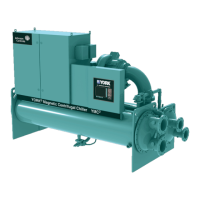FORM 160.84-EG1 (617)
JOHNSON CONTROLS
29
Application Data (Cont'd)
Condenser Water – The chiller is engineered for maximum efficiency at both design and
part-load operation by taking advantage of the colder cooling tower water temperatures
which naturally occur during the winter months. Appreciable power savings are realized
from these reduced heads.
The minimum entering condenser water temperature for other full and part-load condi-
tions is provided by the following equation:
where:
ECWT = entering condensing water temperature
LCHWT = leaving chilled water temperature
At initial startup, entering condensing water temperature may be as much as 30°F
(16.66°C) colder than the standby chilled water temperature.
Min ECWT = LCHWT -30°F (16.66°C)
MULTIPLE UNITS
Selection – Many applications require multiple units to meet the total capacity require-
ments as well as to provide flexibility and some degree of protection against equipment
shutdown. There are several common unit arrangements for this type of application. The
YMC² chiller has been designed to be readily adapted to the requirements of these vari-
ous arrangements.
Parallel Arrangement – Chillers may be applied in multiples with chilled and condenser
water circuits connected in parallel between the units. The figure below represents a par-
allel arrangement with two chillers. Parallel chiller arrangements may consist of equally or
unequally sized units. When multiple units are in operation, they will load and unload at
equal percentages of design full load for the chiller.
COND. 1
COND. 2
EVAP. 1
EVAP. 2
LD18370
S – Temperature Sensor for Chiller Capacity Control
T – Thermostat for Chiller Capacity Control
FIGURE 1 - PARALLEL EVAPORATORS PARALLEL CONDENSERS
Depending on the number of units and operating characteristics of the units, loading and
unloading schemes should be designed to optimize the overall efficiency of the chiller
plant. It is recommended to use an evaporator bypass piping arrangement to bypass fluid
around evaporator of any unit which has cycled off at reduced load conditions. It is also
recommended to alternate the chiller cycling order to equalize chiller starts and run hours.

